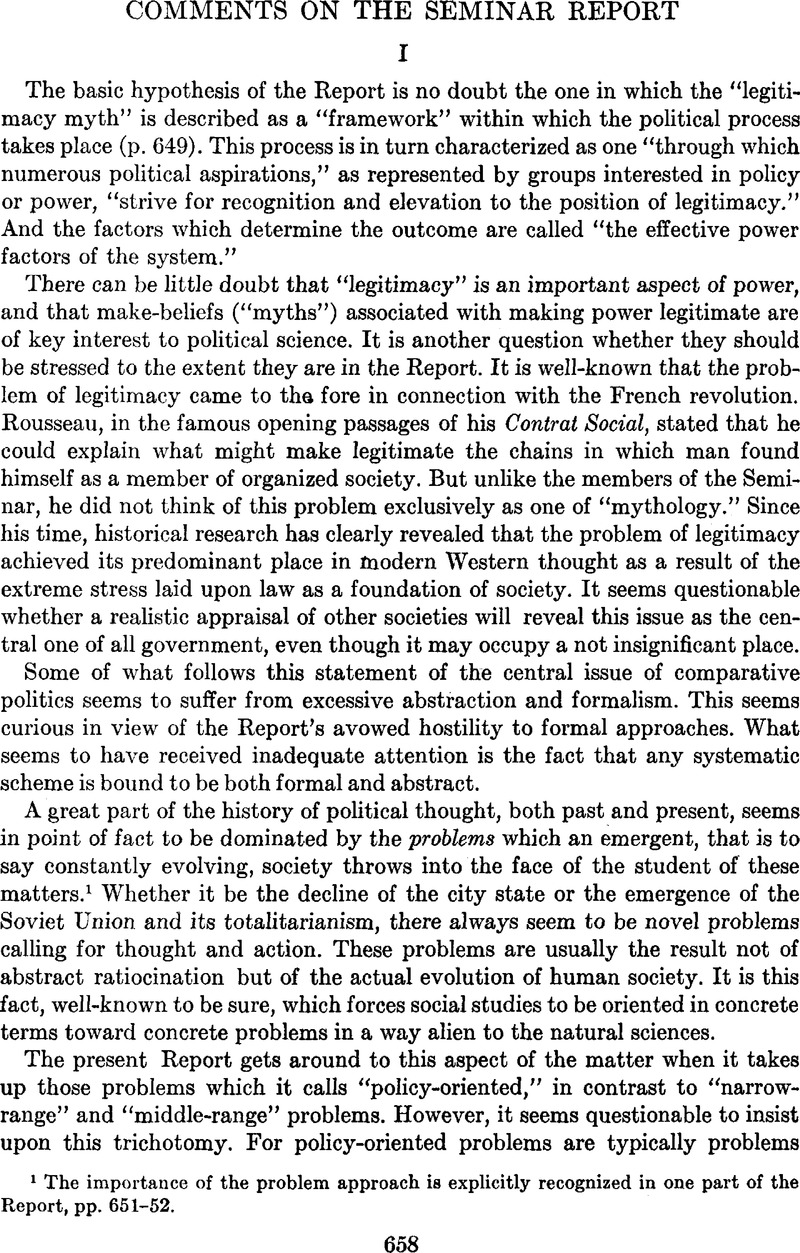Article contents
Comments on the Seminar Report
Published online by Cambridge University Press: 02 September 2013
Abstract

- Type
- Research in Comparative Politics
- Information
- Copyright
- Copyright © American Political Science Association 1953
References
page 658 note 1 The importance of the problem approach is explicitly recognized in one part of the Report, pp. 651–52.
page 659 note 2 The Report employs the word “falsification,” presumably an analogy to “verification,” to designate a procedure by which a certain hypothesis is disproved or proved false. This is not a very fortunate term; but apart from that, it is important to recognize that in any ultimate sense, none of the significant hypotheses of political science can ever be proven or disproven; we are dealing only with degrees of probability on account of the nature of the evidence at our disposal.
page 660 note 3 Lasswell, , in his contribution to The Policy Sciences (Stanford, 1951)Google Scholar, which he edited with Daniel Lerner, has recently claimed “decision-making” to be properly the problem of other social sciences, rather than political science. This appears more than doubtful.
page 661 note 4 Friedrich, Carl J., Constitutional Government and Democracy (Boston, 1941), pp. 593–94Google Scholar.
page 663 note 1 The attention of political scientists may be called to a methodological statement in an overlapping field: McDougal, Myres S., “The Comparative Study of Law for Policy Purposes: Value Clarification as an Instrument of Democratic World Order,” Yale Law Journal, Vol. 61, pp. 915–46 (06-July, 1952)CrossRefGoogle Scholar, published concurrently in the first number of the American Journal of Comparative Law.
page 665 note 1 See Simon, Herbert A., “On the Definition of the Causal Relation,” The Journal of Philosophy, Vol. 49, pp. 517–28 (07 31, 1952)CrossRefGoogle Scholar; and Chapter 3 of Studies in Econometric Methods, ed. Hood, W. and Koopmans, T. (New York, 1953)Google Scholar.
page 667 note 1 Loewenstein, Karl, “Report of the Research Panel on Comparative Government,” this Review, Vol. 38, pp. 542–43 (06, 1944)Google Scholar.
page 667 note 2 Bacon, Bryce, Montesquieu (to cite but a few sages of our cult) discussed the matter brilliantly. Even some of our contemporaries, borrowing from our white-coated colleagues, have talked of the “ecology” of government. And, of course, Northrop, F. S. C. has developed the concept extensively in his The Taming of the Nations (New York, 1952)Google Scholar.
page 667 note 3 One piece of evidence is the fact that two recent presidential addresses at the annual meetings of our Association dealt with this problem. See Pollock, James K., “The Primacy of Politics,” this Review, Vol. 45, pp. 1–18 (03, 1951)Google Scholar and Odegard, Peter, “Variations on a Familiar Theme,” this Review, Vol. 45, pp. 961–74 (12, 1951)Google Scholar.
- 3
- Cited by



Comments
No Comments have been published for this article.